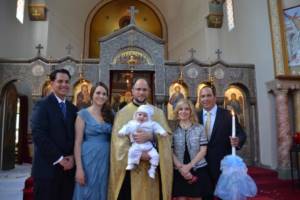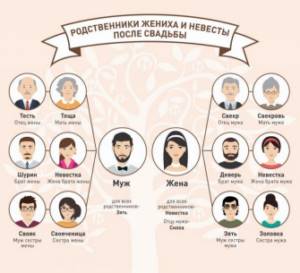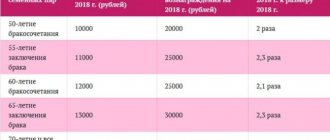Nowadays families are not as big as they used to be. It is enough to know who grandchildren, nephews, grandmothers, grandfathers, and cousins are. And everyone else is simply called relatives. But unlike other languages, Russian is not greedy; it has its own name for everyone. It’s not easy to thoroughly figure out who is related to whom among relatives, and if the relatives of one of the spouses have been added, then it will take a couple of days to remember. To make this process easier, www.svadebka.ws has prepared a cheat sheet for you.
Names of blood relatives
Before moving on to the names of future relatives, you should first figure out who belongs to whom and by whom in your family. There are several degrees of relationship, they count from the first to the sixth, since then the connections become too distant. So, the degrees are in descending order:
- Father - son/daughter, mother - son/daughter.
- Grandfather/grandmother – grandchildren.
- Great-grandfather/great-grandmother – great-grandchildren, uncles/aunts – nephews.
- Cousins/brothers, great-aunts/grandfathers – great-nephews/nieces.
- Cousins/aunts – cousins/nephews/nieces.
- Second cousins and brothers.
If everything is clear with the first degree, then further on the names of these relatives have their own nuances. For grandparents, grandchildren are daughters and sons not only of their children, but also of their nephews.
Uncles/aunts are the brothers/sisters of the mother or father, as well as their spouses, but wives and husbands, of course, are no longer blood relatives. There is also the concept of great and little uncles/aunts. The sister and brother of the grandfather/grandmother were called first, and the father/mother was called second. Nowadays they are simply called great-aunts/uncles and great-aunts/uncles.
Simply, nephews are the children of brothers/sisters, great-nephews, and, accordingly, their grandchildren. But any second cousins are also called grandchildren. Cousins today are often called cousins in the Western manner and their old Russian names - sister and brother - have been completely forgotten. Although the latter is popular in certain youth circles, it does not imply blood relationship. By the way, if you are thinking about how to distribute responsibilities at a wedding, then keep in mind that everyone can be involved in organizing the celebration, even people of the sixth degree of kinship, if, of course, you are familiar with them.

How godparents are chosen
I would like to apologize to the readers for the above story. He could be called funny if he weren't so sad. The story was published in the book of priest Yaroslav Shipov. And it is truthful.
A man comes to church. From among the villagers. He needs to talk to his father. They called the priest from the altar, and the visitor right off the bat. And he has a wild question: is it possible to baptize his son again? The priest, of course, did not allow it. They are baptized once and for life. But I couldn’t resist asking: what is the reason for this decision? To which I received the answer: you can’t drink with your current godparents. The godmother drank herself to death, and the godfather quit.
We in no way want to say that our dear readers baptize children just for the sake of such gatherings. This is completely absurd. But let's think about how we choose godparents for our children. What are we guided by?
- Firstly, we trust those people who should become godparents.
- Secondly, we know: if something happens to us, the godparents will not leave the baby, they will take care of him.
- And thirdly, many godparents help godchildren financially. They buy expensive gifts, go out and entertain them. In general, they relieve parents of part of the costs.
Well, they are good people, of course, the chosen godparents.
That's all true. Just absolutely not the right approach. And before we figure out who the godfather is to the child’s parents, let’s find out how to choose godparents.

Spiritual kinship
The rite of baptism is important for many families; it is believed that the earlier it is carried out, the better. Therefore, as a rule, a child already has new relatives in the first year of life, and we all know well what the relatives who came to the family in this case are called - godfathers, father and mother; among themselves and in relation to the child’s natural parents, they are considered godfathers and godfather. The godson and goddaughter, respectively, are the girl and boy they baptized. Further, the word godfather (godmother) is added to all relatives on this side. But cross brothers or sisters have a different meaning. This is the name given to people who themselves exchanged crosses. In addition to godparents, there may also be imprisoned parents. This is the name given to those who replace their relatives father and mother at the wedding ceremony.

What rights does the in-law have?
Since family and civil law do not generally regulate property relations, acts of family and civil law do not contain references to the range of rights that property owners have in legal relations.
Guarantee of impartiality of the court
The main task of Russian legal proceedings is, first of all, a fair and timely decision on the case. This is only possible with impartial and objective consideration of civil cases by judges. In order to implement the above, every citizen has a guarantee - the right to protection of his rights and interests in court, their equality before the court.
The judge cannot be a relative or relative of one of the defendants.
Not blood, but close
There are cases when people who are not related by blood become a family, for example, when a man and a woman get married, having children from previous marriages, or spouses adopt a child. In this case, family members will be called:
- stepmother - stepmother,
- stepfather - stepfather,
- stepson - step-son,
- stepdaughter - stepdaughter,
- named son - adopted,
- named daughter - adopted,
- the named mother and father are the adoptive parents,
- half-brothers and sisters - natural and step-children of each other.
Also, non-relatives but close ones include people whose names these days can be found more often in films and books than in reality:
- milk mother - a woman who breast-fed a step-child in relation to him,
- foster brother or sister - children who are not related to each other, raised by the same woman,
- uncle, mother - a man or woman who looks after and raises a child, today better known as nannies and nannies.

Family. Etymology and its members
Foreign films often use English terminology. The meaning of the word "cousin" is interpreted in different ways. Sometimes it can be called a good friend with whom there is nothing in common by blood. “You are like a brother to me” - there is a concept for our compatriots, but this does not in any way affect the blood relationship. The etymology of the origin of the word “family” is very interesting. Among the Slavs, it comes from “7” and “I”, that is, you and seven other family members. Wolves, by the way, have a septal number system and do not understand double or triple. If you provide a flock with 7 bowls, then the individuals will easily find out which is whose.
The number seven also haunts the rainbow, the staff, feelings, smells, etc.
Cousins are blood relatives and may be older or younger than you.
Kinship by property or who is who after marriage
As soon as the young people officially became husband and wife, the number of family ties of each of them multiplied by two. And it would be good to know what the relatives you just acquired are called, because in many families it is still customary to address each other according to a long-established tradition. Let's figure out who is related to whom after the wedding.

Hoax of A. S. Pushkin
In conclusion, it is worth considering a short story by Alexander Pushkin, in which he humorously examined the properties of the legendary French heroine Joan of Arc and her distant descendant.
This literary hoax is called "The Last of the Relatives of Joan of Arc." It briefly tells how a relative of the late Jeanne's brother's wife challenged Voltaire himself to a duel for his satirical poem "The Virgin of Orleans" (in this work, the great philosopher rather caustically ridiculed Jeanne and her feat, and in the finale even hinted at d'sexual relations) Ark with one of her loyal followers).
In Pushkin’s story, the fearless Voltaire chickened out and wrote to Jeanne’s relative that in fact he was old and weak and was not the author of that seditious work.
Husband, wife and their parents
Everything is simple here, the names of mothers and fathers of spouses are well-known today and are still actively used. The wife's parents are father-in-law and mother-in-law, the husband's parents are father-in-law and mother-in-law. Between themselves, fathers are matchmakers, and mothers are matchmakers. And they were called that because it was with their participation that the bride’s matchmaking ceremony took place. After the wedding, the wife receives the status of daughter-in-law or daughter-in-law (for the husband's father), and the husband - son-in-law. Interestingly, in the Russian language there is a special word for a husband who settled with his wife’s parents - primak. Previously, this was not accepted, apparently, which is why popular rumor especially singled out such husbands.

Spouses: relatives or in-laws?
When considering this topic, sooner or later you will definitely have to face the question: “Who are husband and wife to each other?” After all, they have no blood relationship (such marriages between close relatives are prohibited by the legislation of most countries of the world).
First of all, spouses are a family, and it is from this point of view that the law views them. However, in different areas the degree of their relationship is viewed differently.
Thus, in criminal law, a husband is not a relative of his wife, but a member of a joint family created with her. The Housing Code treats their relationship the same way.
But tax law considers spouses as close relatives, along with brothers and sisters, parents, and grandparents.
But in the Labor Code the name of the relationship between husband and wife is not precisely formulated. And then each employer chooses for himself whether to consider them close relatives or members of the same family.
Thus, it turns out that from whatever point of view one considers the relationship of the spouses, in any case they will not be considered in-laws. By the way, they cannot become godfathers either. The fact is that, according to church rules, godparents cannot marry. But those who have already joined cannot baptize together.
Brothers and sisters of young people with their spouses
The husband's brother and sister are called brother-in-law and sister-in-law, respectively, while the wife's brother and sister are called brother-in-law and sister-in-law. Speakers of the Eastern European dialect also call the brothers on both sides Schwagers.
As for the brothers' wives, their names and who they are to each other, the Russian language did not skimp on names. There are more of them than for any other relatives - jatras, consorts, and in some regions, like the husband's sister, they are called sister-in-law. Accordingly, brothers' wives are also called in relation to each other.
But the name of the sisters’ husbands is not original; they are all called brothers-in-law among themselves, although the husband’s sister’s husband is separately called son-in-law. To make it clearer what names the acquired relatives have, we suggest taking a look at the diagram, which shows who is related to whom:

Can marriages take place between relatives?
Another question that sometimes still has to be faced is: “Can persons in property enter into marriage?”
If in the case of blood relatives such a prohibition is understandable (degeneration of the breed and the occurrence of hereditary diseases), then in the case of in-laws it is rather a tribute to tradition.
Despite this, in many countries the law prohibits unions between people who are related to each other. However, this is not always justified. For example, if the husband's divorced mother fell in love with his wife's single father. Why don't they get married? Or, as is often shown in television series, the wife’s sister fell in love with her husband’s brother (a similar situation is described in Jane Austen’s novel “Emma”).
It's another matter if the stepfather is going to marry his stepdaughter. It really does look like incest, even though they're not technically related. But then the ban is really justified.
By the way, only in Orthodox countries is marriage between close relatives and in-laws up to the fourth line prohibited. Moreover, among Catholics and Protestants, such a ban applies only to close relatives and first-line relatives.










